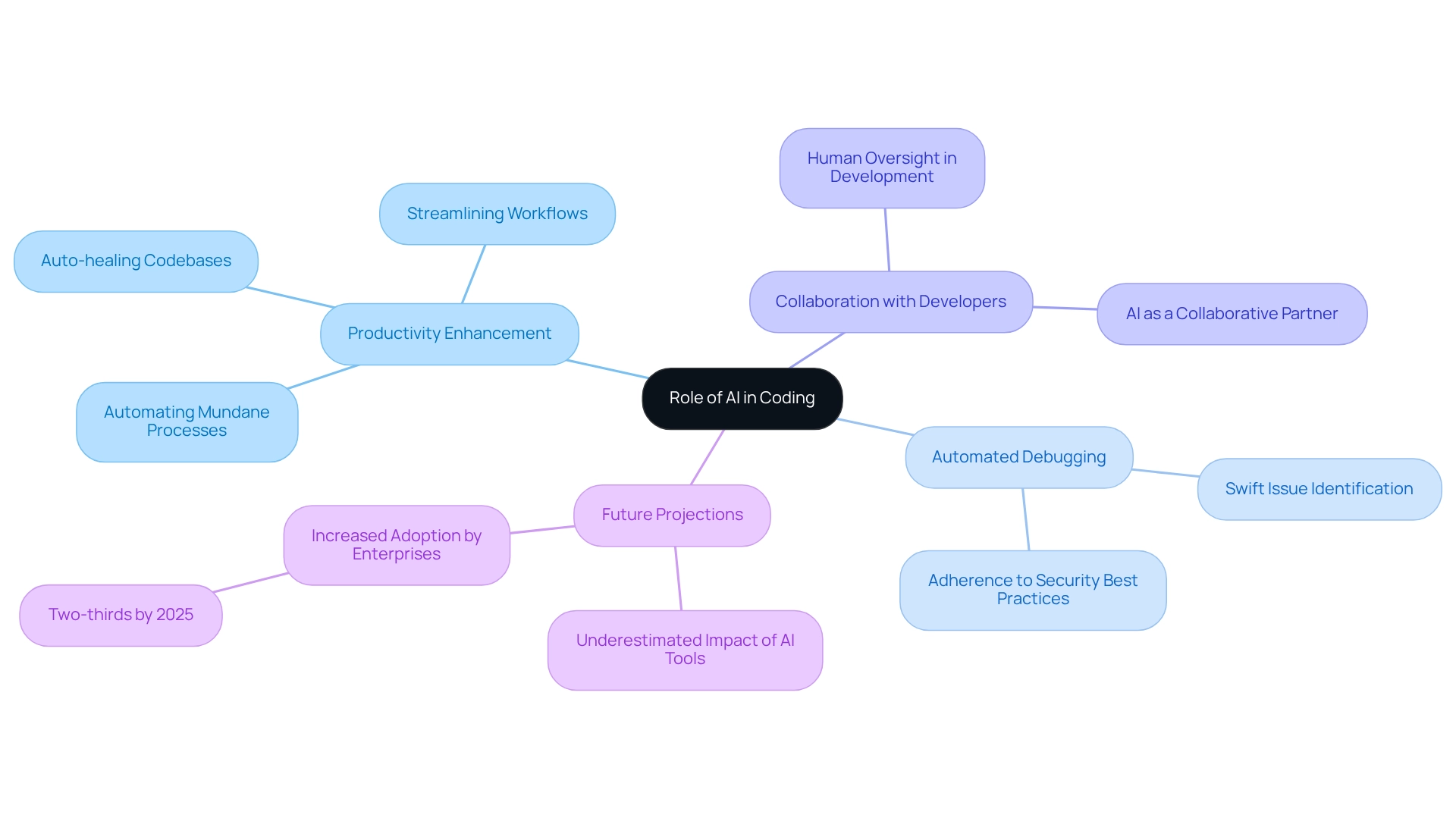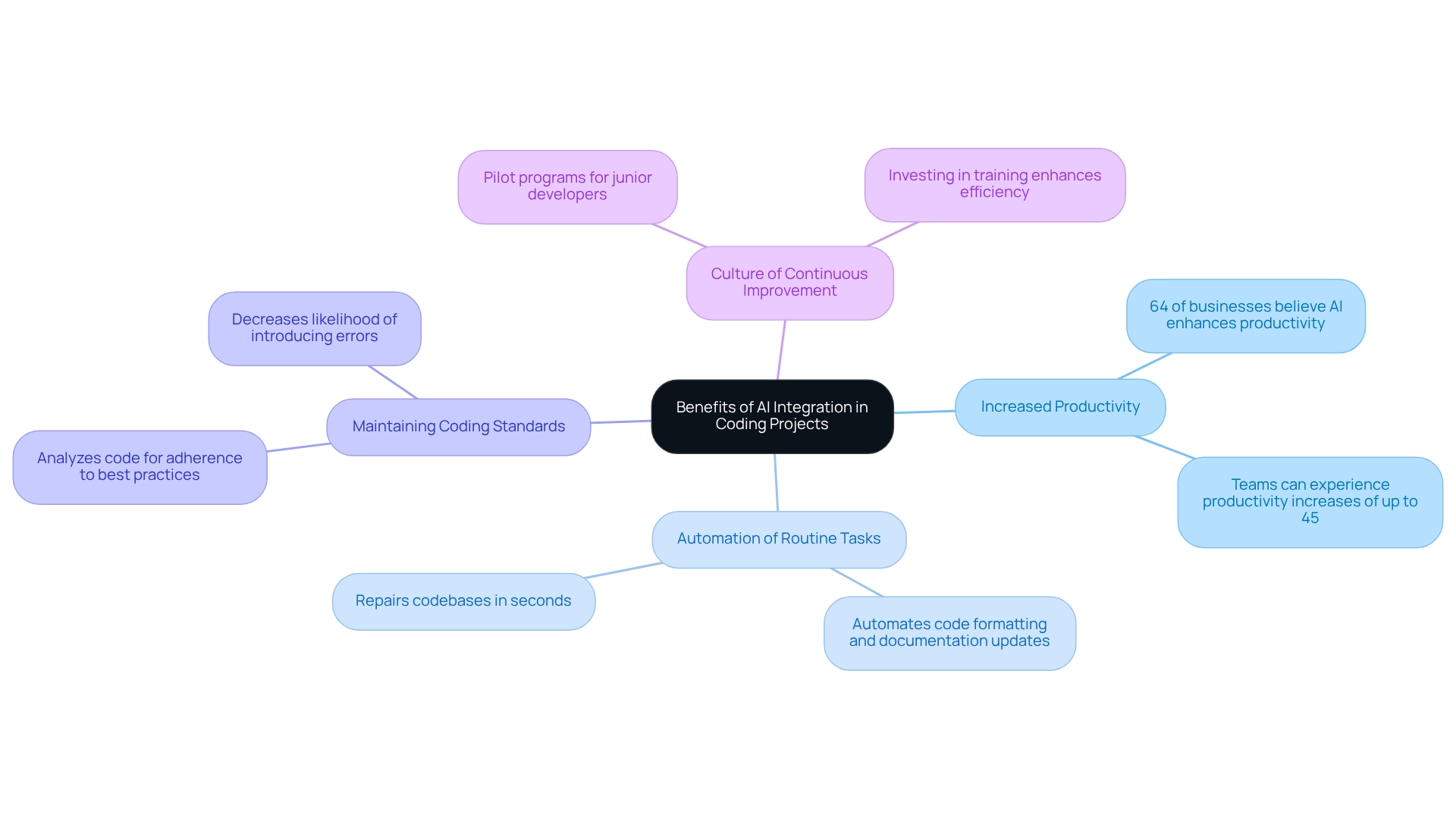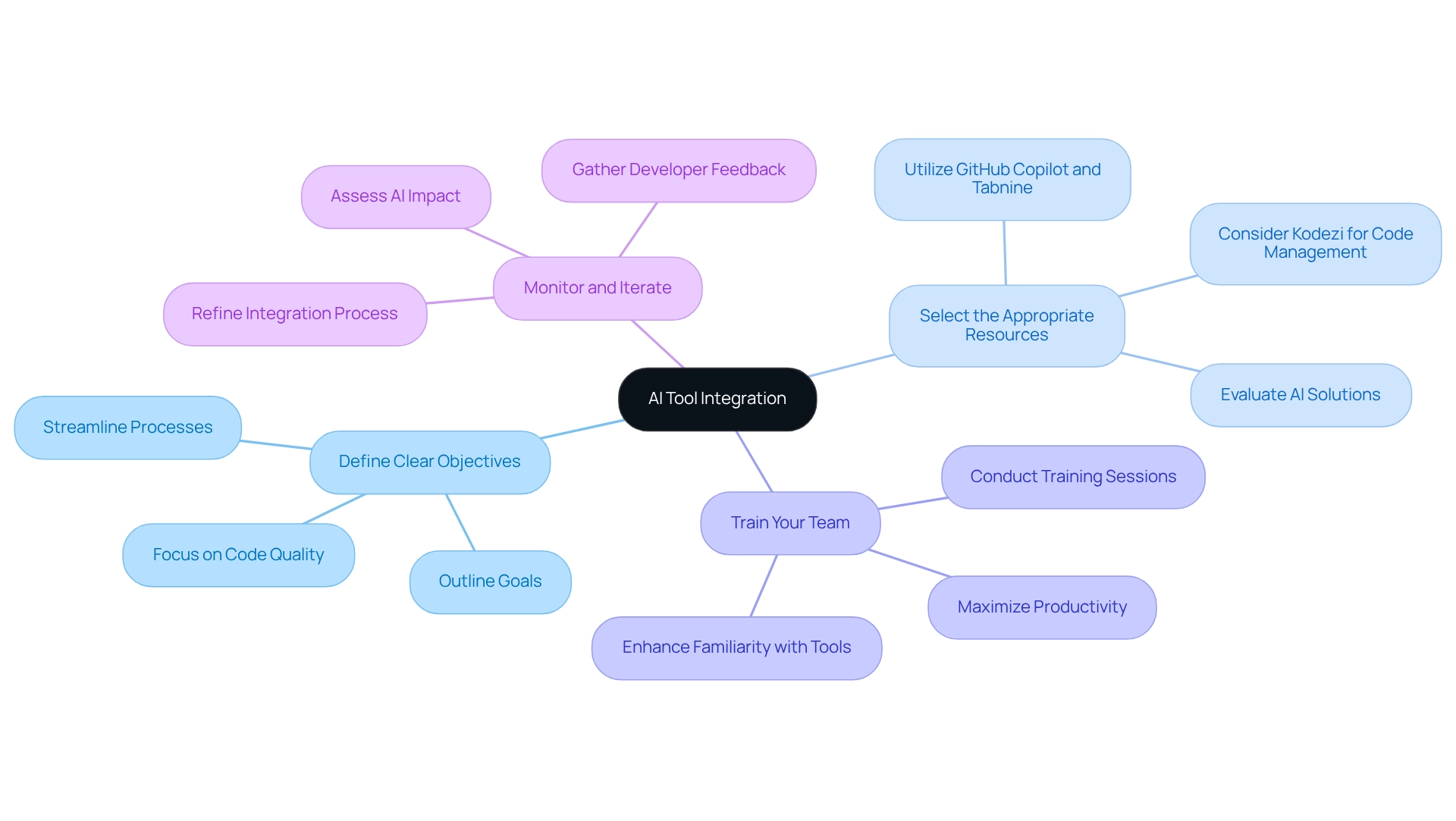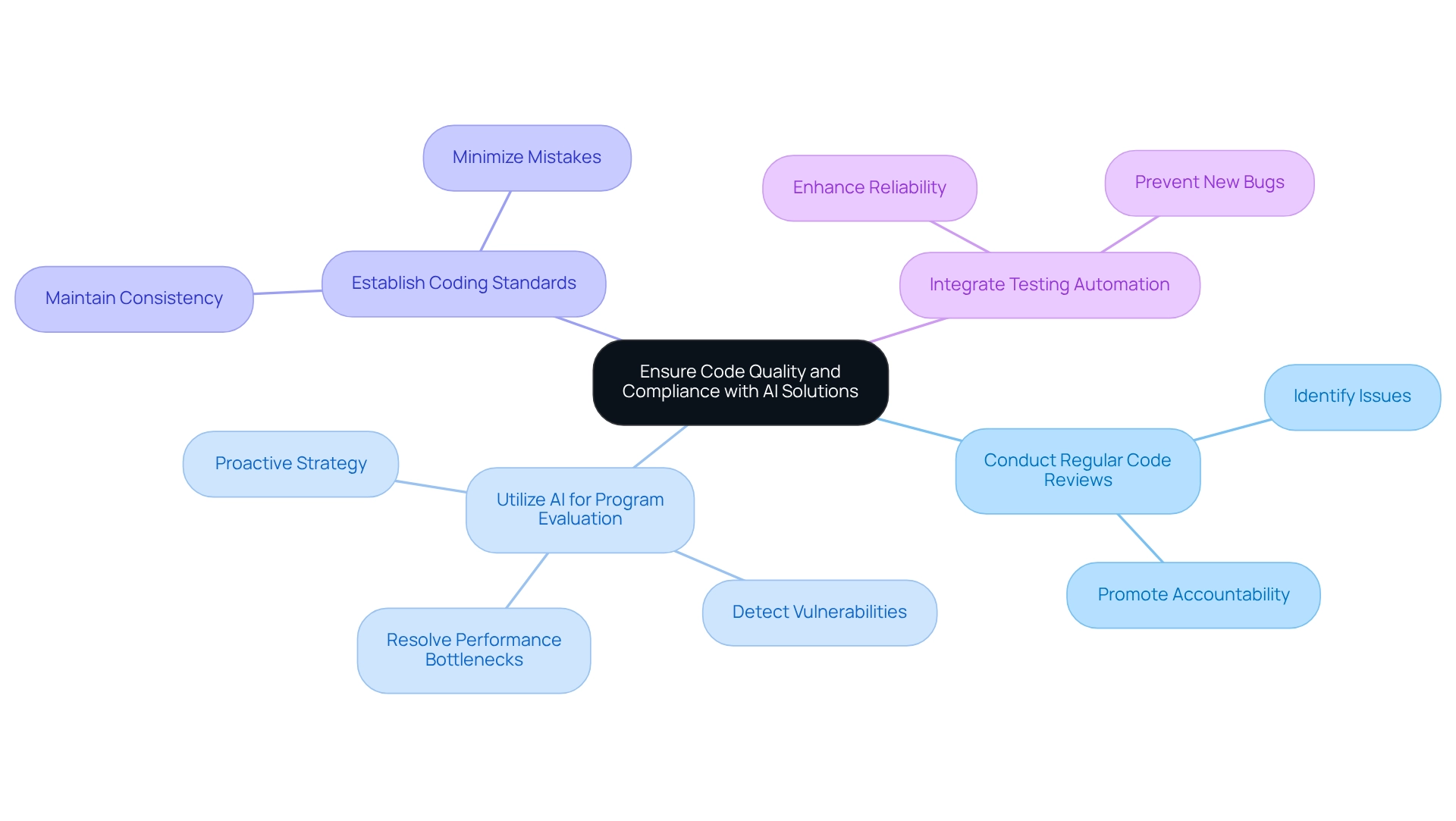Overview
Developers often face significant challenges in coding efficiency, which can hinder productivity and project timelines. Kodezi emerges as a powerful ally in overcoming these obstacles, offering features that automate routine tasks and streamline workflows. By leveraging AI tools like Kodezi, teams can not only enhance code quality but also significantly boost their overall productivity.
Imagine a scenario where mundane coding tasks are automated, allowing developers to focus on more complex problems. Kodezi's capabilities enable this shift, transforming how teams approach development. With clear objectives and the right resources, teams can harness the full potential of Kodezi to improve their coding practices.
The benefits of using Kodezi are compelling. Enhanced productivity, improved code quality, and a more efficient development process are just a few of the advantages that come with integrating this tool into your workflow. Furthermore, continuous monitoring ensures that teams can adapt and optimize their use of AI, leading to sustained improvements over time.
Are you ready to elevate your coding efficiency? Explore the tools available on the Kodezi platform and discover how they can revolutionize your development experience.
Introduction
In the rapidly evolving landscape of software development, developers face numerous challenges that can hinder productivity. How can these obstacles be overcome? Enter Kodezi—an innovative tool designed to automate mundane tasks and enhance code quality. By streamlining workflows, Kodezi becomes an indispensable ally for developers looking to improve their coding practices. As organizations increasingly recognize the potential of artificial intelligence to boost productivity, understanding how to effectively integrate these technologies is paramount.
Furthermore, projections indicate that a significant majority of enterprises will leverage AI for automation by 2025. This makes exploring the benefits of Kodezi essential for teams aiming to thrive in a competitive environment. With Kodezi, developers can expect improved productivity and superior code quality, ultimately leading to more successful projects. Are you ready to explore the tools available on the platform and elevate your coding experience?
Understand the Role of AI in Coding
In today's fast-paced coding environment, developers face numerous challenges, particularly with repetitive tasks and maintaining code quality, which can be addressed with AI for coding. AI for coding plays a crucial role in addressing these issues by automating mundane processes and offering intelligent suggestions. For instance, Kodezi's CLI application empowers teams to auto-heal codebases in mere seconds, significantly enhancing productivity and streamlining workflows.
Furthermore, tools equipped with automated debugging capabilities enable developers to swiftly identify and resolve programming issues. This not only ensures adherence to the latest security best practices and coding standards but also fosters a collaborative coding atmosphere. By 2025, it is projected that two-thirds of enterprises will leverage AI for coding and automation tasks, including quality assurance and code reviews, underscoring the growing reliance on these technologies.
In addition, understanding AI's capabilities allows developers to view it as a collaborative partner rather than a replacement. The case study 'Future of AI in Software Development' highlights that the potential impact of AI for coding assistants may be underestimated as the technology continues to evolve. By recognizing both the strengths and limitations of AI, teams can effectively integrate these tools into their workflows, ensuring that human oversight remains a critical component of the development process.
As you consider future projects and staffing needs, long-term strategic planning should factor in the potential for significant productivity increases. Why not explore the tools available on Kodezi's platform? Embracing these innovations could lead to remarkable improvements in your coding practices.

Explore Benefits of AI Integration in Coding Projects
Developers often face significant coding challenges that can hinder their productivity and the quality of their software. Incorporating AI for coding into programming projects, such as Kodezi, provides a solution to these issues by automating routine tasks like code formatting, documentation updates, and bug detection. This automation allows developers to focus on more intricate problem-solving, ultimately enhancing their efficiency.
With a user base exceeding 1,000,000, Kodezi has proven to be a versatile tool for boosting programming productivity, as highlighted by testimonials from satisfied users. For instance, developers have noted that the command line interface can automatically repair codebases in seconds, which significantly reduces the time spent on pull requests and debugging. Research shows that 64% of businesses believe artificial intelligence will enhance their overall productivity, and studies indicate that teams utilizing AI for coding assistants can experience productivity increases of up to 45%.
Furthermore, Kodezi aids in maintaining coding standards by automatically analyzing code for adherence to best practices. This feature decreases the likelihood of introducing errors into the codebase. In addition, insights from case studies reveal that implementing pilot programs for junior developers and investing in training can significantly enhance the efficiency of AI for coding applications like Kodezi.
This integration not only streamlines workflows but also fosters a culture of continuous improvement within development teams, positioning them for sustained success. Are you ready to elevate your coding practices? Explore the tools available on Kodezi and witness the transformation in your development process.

Implement Effective Strategies for AI Tool Integration
In the fast-evolving world of software development, teams often face significant challenges, such as minimizing bugs and accelerating development. To successfully incorporate AI for coding into workflows, it is essential to adopt several strategies.
- Define Clear Objectives: Start by clearly outlining the goals for AI integration. Whether it's enhancing code quality or streamlining processes, this focus will guide the selection and implementation of resources.
- Select the Appropriate Resources: Choosing the right AI solutions is crucial. Solutions like GitHub Copilot and Tabnine excel at generating software, but Kodezi stands out by independently managing codebases, identifying bugs, and ensuring long-term quality and compliance. Kodezi's AI-driven programming solution automatically rectifies code, making it an ideal choice for teams looking to boost productivity across various languages and IDEs.
- Train Your Team: Have you considered how well your team understands these AI tools? Conducting training sessions can equip team members with the knowledge to effectively utilize these resources. Familiarity with these technologies is vital for maximizing their potential and enhancing overall productivity.
- Monitor and Iterate: Furthermore, it’s important to continuously assess the impact of AI resources on your workflows. Regular feedback from developers can inform necessary adjustments, refining the integration process and enhancing effectiveness. As organizations increasingly adopt AI, those that strategically integrate these resources into their development processes are positioned to gain a competitive advantage. By 2025, it is projected that two-thirds of enterprises will leverage AI for automation tasks. This underscores the importance of adopting best practices for integrating AI for coding into workflows.
Ready to explore how Kodezi can transform your coding practices? Discover the tools available on the platform and elevate your development process today.

Ensure Code Quality and Compliance with AI Solutions
In the ever-evolving landscape of software development, ensuring quality and compliance when utilizing AI for coding solutions is paramount. Developers often face significant coding challenges that can hinder productivity and lead to potential risks. To address these issues, adopting best practices is essential.
- Conduct Regular Code Reviews: Human oversight remains crucial, even with AI assistance. Regular programming reviews are vital for identifying potential issues that AI might miss, promoting a culture of accountability and ongoing enhancement.
- Utilize AI for Program Evaluation: Implement AI tools designed to analyze software for vulnerabilities and adherence to coding standards. Tools like Kodezi's automated debugging feature can instantly detect and rectify issues within the codebase, offering detailed explanations and insights into what went wrong and how it was addressed. This proactive strategy enables teams to tackle risks before they intensify, ensuring adherence to security best practices and coding standards. Additionally, the tool assists in resolving performance bottlenecks and improving formatting, further optimizing the codebase.
- Establish Coding Standards: Clearly defined and documented coding standards are essential for maintaining consistency across the codebase. AI for coding can be configured to automatically uphold these standards, ensuring that all team members follow best practices and minimizing the chances of mistakes.
- Integrate Testing Automation: Using AI for coding to automate testing processes is crucial for preserving software quality. By utilizing automated testing frameworks alongside Kodezi's functionalities, teams can ensure that changes do not introduce new bugs, thereby enhancing overall software reliability. This approach aligns with findings that predictive analysis prioritizes changes based on risk, ultimately improving decision-making during software development.
Incorporating these strategies not only enhances code quality but also builds trust in AI systems, addressing the concerns of the 61% of developers who are wary of relying solely on AI for critical tasks. As Gabriel Bejarano asserts, AI will not replace developers due to the creativity involved in software building. By combining human expertise with AI capabilities like those offered by Kodezi, teams can navigate the complexities of modern software development more effectively. Why not explore the tools available on the Kodezi platform and see how they can transform your coding practices?

Conclusion
In the dynamic realm of software development, developers often face significant coding challenges that can hinder their productivity. Fortunately, AI tools like Kodezi are stepping in to address these issues. By automating repetitive tasks and enhancing code quality, Kodezi allows developers to concentrate on more complex problem-solving rather than being bogged down by mundane duties. This shift not only improves efficiency but also fosters a more innovative coding environment.
The advantages of integrating Kodezi into coding projects are substantial. Enhanced productivity, improved code quality, and accelerated development cycles are just a few of the benefits that this tool offers. With a user base exceeding one million, Kodezi has proven to be a reliable resource for developers, significantly reducing the time spent on debugging and code management. As more organizations recognize the transformative potential of AI, the focus on strategic integration and training becomes essential for maximizing the effectiveness of these tools.
To ensure successful integration of AI tools like Kodezi, teams should:
- Establish clear objectives
- Select appropriate tools
- Train their members
- Continuously monitor the impact of these technologies on their workflows
Regular code reviews and adherence to coding standards remain crucial, as human oversight enhances the effectiveness of AI solutions, ensuring that quality and compliance are never compromised. By blending human creativity with AI capabilities, development teams can navigate challenges more effectively, leading to greater innovation and success in their projects. As we look to the future, the collaboration between developers and AI tools will undoubtedly define the next generation of software development, making it imperative for teams to adapt and evolve.
Frequently Asked Questions
What challenges do developers face in coding that AI can help address?
Developers face challenges such as repetitive tasks and maintaining code quality, which can be alleviated through AI for coding by automating mundane processes and offering intelligent suggestions.
How does Kodezi's CLI application enhance productivity?
Kodezi's CLI application allows teams to auto-heal codebases in seconds, significantly enhancing productivity and streamlining workflows.
What role do automated debugging tools play for developers?
Automated debugging tools enable developers to quickly identify and resolve programming issues, ensuring adherence to security best practices and coding standards while fostering a collaborative coding atmosphere.
What is the projected reliance on AI for coding by 2025?
It is projected that by 2025, two-thirds of enterprises will leverage AI for coding and automation tasks, including quality assurance and code reviews.
How should developers view AI in the context of their work?
Developers should view AI as a collaborative partner rather than a replacement, recognizing both its strengths and limitations to effectively integrate these tools into their workflows.
What does the case study 'Future of AI in Software Development' suggest about AI's impact?
The case study highlights that the potential impact of AI for coding assistants may be underestimated as the technology continues to evolve.
What should teams consider when planning for future projects and staffing needs?
Teams should factor in the potential for significant productivity increases when considering long-term strategic planning for future projects and staffing needs.




